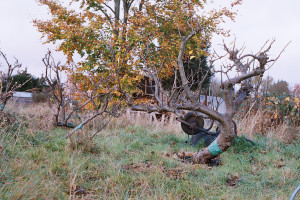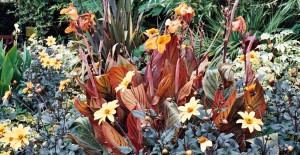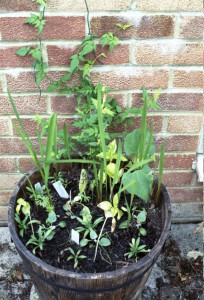After our relaxation, and a little sleep, I awoke refreshed.
We were now offered a short explanation about how we ‘Touch the Earth’ (prostrate) in the tradition of Thich Nhat Hanh, reassured that we need not do so if we were not comfortable doing so, but invited to participate if we wished to. I was happy to join in, I like to actually participate in the activities of other faith groups, to get a feel for how it may be to belong to that tradition.
Think about your ancestors, your blood ancestors, we were invited. Your parents, grandparents, great-grandparents, and their parents and grandparents before them. See them as people with ideals and problems just like everybody else. They all did the best they could for you, but they also made mistakes, knowingly or unknowingly, just as we do for our children and their children. Keep the best things they did for you and let the mistakes go. Let the mistakes return to the earth. At this point we prostrated ourselves (cushioned by the sleeping mats) and spent some time in silence with our feet, knees, hands and foreheads on the ground. Touching the Earth.
Standing again, we were invited to think of our land ancestors, those who had been in this place before us, in the place we have come to make our home, even if it was not the place where we were born. In so many ways the people who have lived here before us have made the land the way it is now. They too did their best, but they too made mistakes Keeping the best that we can learn and accept from them, we touch the earth and let the rest go.
When we are standing once more, we are invited to think of our spiritual ancestors. They may come from the tradition we grew up with, from one we have joined, from others we have learnt about. Some examples were offered: Jesus, Moses, Gandhi, George Fox, … space left to add our own. They too were not perfect, but they did their best. We touch the earth again.
The meditation continued through two more earth touchings, though I don’t now remember the content of the guidance.
I had heard of this profound way of connecting with our ancestors, but not experienced it before. It made a deep impression on me.
I have since participated in similar exercises several times. One in which the guidance invited us to remember of ourselves as a five year old child. Then to remember our parent, to think of them as a five year old child, to see things through their eyes then.
I wasn’t sure how this affected me, until I went out with my camera later that day. As I looked through the viewfinder at the plants in the garden, I realised that I was looking through my father’s eyes. He who photographed me so often in my early years; who taught me not only how a camera worked and how to use it, how to process the film and print the pictures, but also how to see the world through the lens and hope to capture something of it.
Besides this formal touching the earth practice, I have become aware of the spiritual importance of actual contact with the earth in my daily life. In meditation we are encouraged to sit with buttocks and knees firmly on the ground (or a cushion), or, if sat in a chair to be aware of our seat on the chair and both feet flat on the floor (many Quakers find this helpful in settling into worship). In walking meditation we are aware of our feet on the floor, or the ground outside (I love to do a walking meditation barefoot in Woodbrooke’s labyrinth). I find this very helpful when walking in my daily life (though I go somewhat faster than in formal walking meditation), it keeps me grounded in the present time and place. At least, it does when I remember to do it. However, since I tend to trip if I forget, I get a lot of reminders.
I have also come to understand that practical activities that actually, or almost, involve touching the physical earth can be deeply spiritual, and spiritually, as well as physically, grounding. I call them ‘getting my hands dirty’ activities. Actual gardening is probably best, weeding, sowing, harvesting, digging (when I can). Cooking, especially straight forward meal preparation, preferably with plenty of vegetable washing and chopping, is excellent too. Mixing bread dough by hand and washing up are good. Other hands on activities such as knitting and sewing are also helpful. I’m sure you can find your own examples. Incorporating some of these into my daily routines is important, rather than getting too involved in writing, reading, thinking, talking, discussing and other ‘head stuff’ all the time. Keeping my feet, literally and metaphorically, well grounded.
Now to go and wash the kale and mushrooms for our supper …



